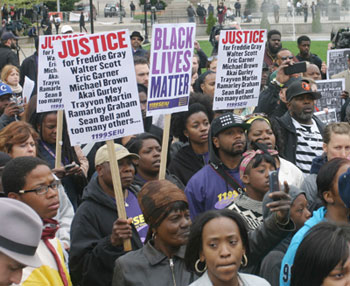

Vol. 79/No. 17 May 11, 2015

|
| Militant/Seth Galinsky |
| Members of health care workers union 1199SEIU join April 23 rally outside Baltimore City Hall demanding prosecution of cops responsible for the death of Freddie Gray. |
After some protesters and youth exploded in anger April 27 over Gray’s death and years of police harassment and abuse, throwing bottles at cops and trashing property, Gov. Larry Hogan declared a state of emergency and called in 2,000 National Guard troops. Mayor Stephanie Rawlings-Blake imposed a weeklong nighttime curfew. More than 1,000 additional cops have been sent from New Jersey and Pennsylvania to join Baltimore’s 3,000-strong force.
Government officials — from President Barack Obama to Rawlings-Blake — have smeared these workers and youth as “thugs” and “criminals.”
Gray, 25, was arrested April 12 after cops claimed he “fled unprovoked upon noticing police presence” in an area known for drug dealing. After detaining him they say they found a knife. One video shows Gray, held down by cops, with his legs folded back “in a pretzel type of move,” the man who filmed it told the press.
The video shows the cops dragging Gray handcuffed, screaming in pain, as they put him in the back of a police van. A second video shows the van stop a few minutes later as cops pull Gray out, put him in leg irons and then back inside. The cops stopped a third time to sit him back up from the floor of the van.
Injuries from being transported in police vans are so common in Baltimore that residents have a name for it: the “rough ride.”
On April 30 Deputy Police Commissioner Kevin Davis reported a private surveillance video revealed that the van had stopped in a desolate area an additional time. “That’s new to us,” Davis said.
Baltimore Police Commissioner Anthony Batts says it is unknown how Gray’s spinal column became 80 percent severed and his windpipe crushed. He died a week later. Six cops involved have been suspended — with pay, which has added to the outrage.
Daily protests grow
West Baltimore is 97 percent Black. Unemployment is double the city average. It is full of abandoned row houses, sandwiched between occupied homes and empty lots.
“The police commissioner promised us they’re going to investigate,” Gray’s brother-in-law Juan told a rally at City Hall April 23. “It’s not about Black, white or Mexican anymore. We’re fighting for the same things. The mayor is Black and she’s turned her back on us.”
In addition to the mayor, the police commissioner, the city’s lead prosecutor and half of Baltimore’s cops are Black.
“They don’t live the way we live,” unemployed carpenter Leon Park told the Militant.
Park was there when the cops put the leg irons on Gray. “I heard Freddie calling for help,” Park said. “I saw the cops around him and they told us to back off or they would arrest us. They thought they could sweep this under the rug, but we won’t let them.”
“The cops get away with so much,” Keisha Turner, who knew Gray, told the Militant. “OK. Freddie ran, young people they run a lot. Is that a reason to deserve to die?”
More than 1,000 people from Baltimore and beyond marched April 25. City and police officials slandered those who came to march from other cities, saying their act of solidarity was the work of “outside agitators.”
After Gray’s funeral April 27, some youth smashed car windows, broke into some stores and fought with riot-gear-clad cops. Some 235 people were arrested and at least 20 cops injured by the end of the day.
Democratic and Republican party politicians from the White House to Baltimore City Hall berated the demonstrators. Obama said April 28 that he condemned the “criminals and thugs who tore up the place,” for not protesting in what he called “the right way.” Being a cop is “a tough job,” he said, and those who had looted should “be treated as criminals.”
In her first statement since being sworn in as the new U.S. attorney general, Loretta Lynch, the first Black woman to hold the post, took aim not at the cops responsible for Gray’s death, but at “senseless acts of violence by some individuals in Baltimore that have resulted in harm to law enforcement officers, destruction of property and shattering of the peace in the city of Baltimore.”
Long history of police abuse
A September article by the Baltimore Sun exposed widespread cop brutality here.
The paper reported that over the past four years more than 100 people have received some $5.7 million after winning court cases or settlements over cop brutality.
“Those cases detail a frightful human toll,” the Sun said. “Officers have battered dozens of residents who suffered broken bones — jaws, noses, arms, legs, ankles — head trauma, organ failure, and even death, coming during questionable arrests.”
Working people and youth in Baltimore have welcomed those who come to advance the fight for Freddie Gray.
The rising social movement challenging racist brutality and cop violence — from Staten Island to Ferguson and now Baltimore — is reinforced by growing labor resistance, from the fight for $15 an hour and a union among Walmart and fast-food workers to rail and oil workers demanding control over safety on the job.
More than 1,000 people marched in Baltimore April 29. A large protest has been called here for May 2.
Related articles:
Join fight against Baltimore cop brutality!
Front page (for this issue) |
Home |
Text-version home